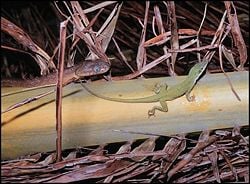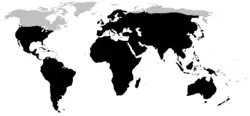Squamata
| Scaled reptiles | ||||||||
|---|---|---|---|---|---|---|---|---|
 Brown tree snake and Green anole
| ||||||||
| Scientific classification | ||||||||
| ||||||||
 black: range of Squamata
| ||||||||
|
see text |
- This article is about the Squamata order of reptiles. For the Roman scale armour see: Lorica squamata.
Squamata (scaled reptiles) is the largest recent order of reptiles, including lizards and snakes. Members of the order are distinguished by their skins, which bear horny scales or shields. They also possess movable quadrate bones, making it possible to move the upper jaw relative to the braincase. This is particularly visible in snakes, which are able to open their mouths very widely to accommodate comparatively large prey. The male members of the group Squamata are the only vertebrates with a hemipenis. This is also the only reptile group in which can be found both viviparous and ovoviviparous species, as well as the usual oviparous reptiles.
Overview
Add info on reptiles here
Groups
Classically, the order is divided into three suborders:
- Lacertilia, the lizards;
- Serpentes, the snakes;
- Amphisbaenia, the worm lizards.
Of these, the lizards form a paraphyletic group. In newer classifications the name Sauria is used for reptiles and birds in general, and the Squamata are divided differently:
- Suborder Iguania (the iguanas and chameleons)
- Suborder Scleroglossa
The exact relationships within these two suborders are not entirely certain yet, though recent research strongly suggests that several families form a venom clade which encompasses a majority (nearly 60%) of Squamate species.
The Squamata do not include the tuataras, New Zealand reptiles resembling lizards.
ReferencesISBN links support NWE through referral fees
External links
{[credit|Squamata|172960739}}